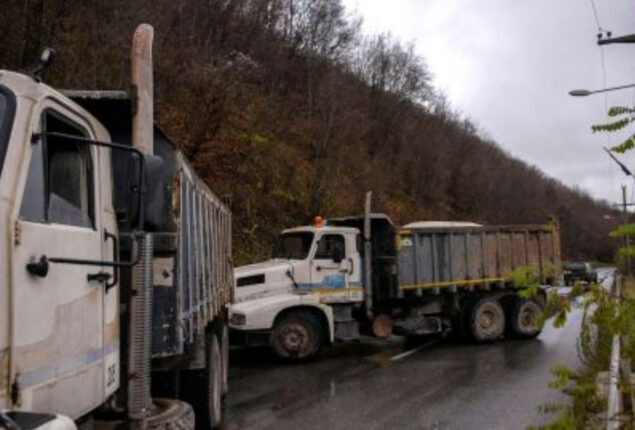Kosovo govt giving extra documents to Serbs who cross into its region
Kosovo's government started giving extra documents to Serbs who crossed into its...

Kosovo asks NATO involvement after weekend ethnic conflict
Kosovo’s Prime Minister called NATO peacekeeping troops to intervene after minority Serb demonstrators blocked roads and unidentified gunmen fired at police over the weekend amid escalating racial tensions in the restive north of the nation.
At a news conference in Kosovo’s capital Pristina on Sunday, Prime Minister Albin Kurti asked the Kosovo Force (KFOR), a NATO-led international peacekeeping force, to guarantee “freedom of movement,” as he accused “criminal gangs” of blocking roads.
Since Kosovo’s 2008 declaration of independence from Serbia, which followed the 1998–1999 conflict in which NATO intervened to defend Kosovo’s Albanian majority, a precarious peace has been maintained in the region. The independence of Kosovo is rejected by Serbia.
Minority Serbs in northern Kosovo have recently reacted violently to actions they perceive as anti-Serb by Pristina.
After a former Serb policeman was taken into custody on Saturday, Serb demonstrators shut down major thoroughfares. Later, Kosovo police claimed in a news release, they came under small-arms fire in a number of sites and retaliated in self-defense.
In the meantime, a car belonging to EULEX, the European Union mission in Kosovo, was struck by a stun grenade. There weren’t any accidents.
The ex-police officer is “accused of committing terrorist acts and attacking the constitutional order,” according to Kosovar authorities, who accuse him of organizing attacks on the country’s election commission and police.
Following the flare-up, the EU, the US, and NATO demanded that all parties exercise moderation and that the barricades be taken down.
Additionally, the Kosovar government postponed the municipal elections that were scheduled for this weekend until April.
Aleksandar Vucic, the president of Serbia, said on Saturday that Belgrade will ask KFOR for permission to send troops and police into Kosovo, although he conceded there was no possibility of success.
On Sunday, Vucic stated that while Serbia works to alleviate tensions in the area, it also demands the release of all Serbs detained in northern Kosovo.
Kurti, the prime minister of Kosovo, and the Pristina government, according to Vucic, have made “countless unilateral actions” to inflame the situation.
“Whenever one would think we have something solved, another problem emerges,” Vucic said.
Along with local judges and 600 police officers, Serb mayors in northern Kosovo municipalities resigned last month in protest of a Kosovo government decision to switch out Belgrade-issued licence plates for Pristina-issued ones.
Later, Kosovo consented to defer the choice, and Belgrade announced it would suspend issuing new Serbian vehicle identification numbers.
In accordance with an EU-brokered deal that calls for the approval of Serb mayors in the region for that, Vucic urged the release of recently detained Kosovo Serbs “since they are held on trumped-up accusations” and the withdrawal of Kosovo police.
“Kosovo police has nothing to do in the north…especially people armed…up to their teeth,” Vucic said. “That causes uneasiness and fear among the Serb population.”
In an effort to improve relations, Belgrade and Pristina are currently having discussions in Brussels, and the EU has already made a plan available.
Catch all the World News, Breaking News Event and Latest News Updates on The BOL News
Download The BOL News App to get the Daily News Update & Follow us on Google News.